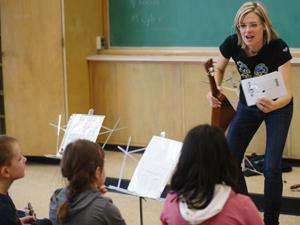The effects of musical training on children's social and emotional skills

Can group musical training produce more sympathetic, kinder and socially adept children? The latest study out of Professor Glenn Schellenberg's lab in the Department of Psychology at U of T Mississauga certainly suggests this to be the case.
In a study that was just published in the prestigious PLOS ONE, Schellenberg and his research team worked with children ages eight and nine and studied the effects of musical training on their social and emotional skills. Schellenberg's study compared children who attended 40 minute, weekly group music lessons over the course of a 10-month period, the length of the elementary school term, with a control group, which consisted of youth who did not attend the lessons; both groupings were from similar socioeconomic backgrounds.
Schellenberg's lab administered tests at the start of the school year to provide a benchmark for emotion comprehension, sympathy and general prosocial skills, and then tested again in the same areas in the spring to measure variations.
Their findings showed that for children who started off with good social skills, it didn't matter whether they were taking music lessons or not. For children who started off with poor social skills, however, taking group music lessons led to larger improvements over the course of the year. These participants showed a marked increase in their scores testing sympathetic attitudes, and in their prosocial skills, which included scenarios associated with helping others, conflict resolution and sharing. Schellenberg suggests that the subjects taking the music classes might benefit from the general peer interaction, and that children's innate interest in music may have a unifying effect.
"One of the important factors in our study was the impact of group music lessons in particular," says Schellenberg. "In introducing the social aspect there seems to be a motivation to provide support for others and a willingness to receive help from peers. It may be the social aspect engendered by the lessons, but also that sense of collaboration and cooperation."
Schellenberg and his team hope to continue further with this line of inquiry, perhaps focusing on at-risk youth in the next related study.
More information: E. Glenn Schellenberg et al. Group Music Training and Children's Prosocial Skills, PLOS ONE (2015). DOI: 10.1371/journal.pone.0141449


















